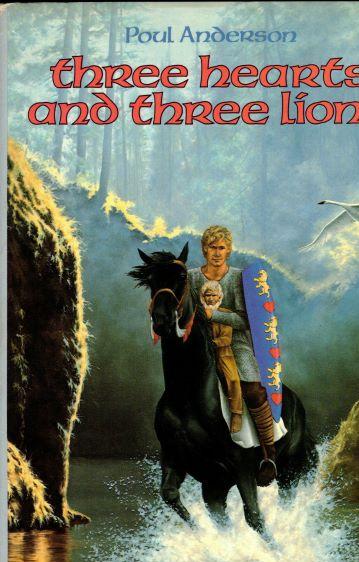Poul Anderson's 1961 novel, Three Hearts and Three Lions (originally released in two parts in the September and October 1953 issues of The Magazine of Science Fiction and Fantasy) is one of the most influential fantasy tales ever written, though I imagine very few fantasy fans under the age of 50 have read it. Michael Moorcock, for example, thought very highly of it, borrowing its conception of the eternal war of Law versus Chaos for his Elric stories, which in turn influenced countless other authors. Among those was Gary Gygax, whose conception of alignment in Dungeons & Dragons – itself a remarkably influential fantasy text – derives equally from Moorock and Anderson, hence the inclusion of both authors in Appendix N to his Dungeon Masters Guide.
I was (and am) a huge fan of Poul Anderson's science fiction stories, particularly those featuring the character of Dominic Flandry, but I don't think I picked up any of his fantasy stories until sometime after I'd already started playing D&D. When I finally did so, I think it was The High Crusade that initially most impressed me. In the years since, my appreciation for Three Hearts and Three Lions has eclipsed it, especially as I came to understand its importance to the subsequent history of fantasy.
The first book edition appeared in 1961 as a hardcover from Doubleday and featured a fairly obvious cover image, though its artist is notable – Edward Gorey:









I like the Powers and Woodroffe versions best, the rest seems mostly skilled but rather ordinary art with little vision.
ReplyDeleteWoodroffe's cover is very psychedelic and reminds me of Bob Pepper's art
( I enjoy Anderson's fantasy and sf a big deal, my soft spot is for his Manse Everard/Time Patrol series)
ReplyDeleteThanks. I will read it.
ReplyDeleteI had the Ace edition, more despite the cover than because of it. Serviceable, but rather bland and unimaginative.
ReplyDeleteFWIW, I owned and played the SPI High Crusade board game from Ares. It's pretty good, a nice strategic-level simulation that reflects the events of the book fairly well. Well worth picking up that issue of Ares if you can find one intact - and there's a short story in the HC setting that I've never seen printed anywhere else, so that's a bonus.
Alas, neither this book nor Anderson's The Broken Sword did much for me. :(
ReplyDeleteI would say The High Crusade is another of his sci-fi stories, despite the medieval setting :) Everyone talks up this one, The Broken Sword, for good reason, and his viking stories, but I have a soft spot for Operation: Chaos, his alternate history in which WWII is fought with magic.
ReplyDeleteI'm pretty sure the Lundgren edition is the one I have, but I like Jones's version best of these.
Yeah, it's entirely scifi. Closest it gets to fantasy is some superstitious beliefs which are just that - superstition.
DeleteI've read this twice, and I don't remember a word of it. I think the Ace cover cemented it in my mind as "goofy". On the other hand, The Broken Sword shaped my approach to fantasy.
ReplyDeleteWhen I started reading OSR blogs 11 (?) years ago, I saw Three Hearts name-checked often enough to request a library copy. I didn't have to read far before recognizing it as something I'd checked out from my childhood public library as a kid in the late 70s. As I went on, I relived not having liked it.
ReplyDeleteIt's just so randomly episodic --- there's a chapter where they're fleeing from or chasing the bad guys but pause at a mansion to solve a werewolf murder mystery before entering the woods again. I guess there is something old-school D&D about that, but even compared with other young-adult fantasy (like the Taran Wanderer books) it seemed lame.
I've been trying to find a copy of Thee Hearts and Three Lions in local bookstores. Found it once, decided to hold off for my next paycheck, then never found it again. Did find The High Crusade though, and that was great so I look forward to reading it.
ReplyDeleteÏ used to own that Sphere paperback with Patrick Woodroffe illustration. I liked the book in my twenties but it`s been a long while so I don`t know what it would feel like today. I must say I consider Poul Anderson a bit overrated writer. I thought Tau Zero was a great idea but a disappointing execution. And The Broken Sword just left me cold.
ReplyDeleteWell, I just finished the book and loved it. To my disappointment, I felt it finished suddenly. I wanted the tale to continue! I can see where many elements of D&D spring from it.
ReplyDelete